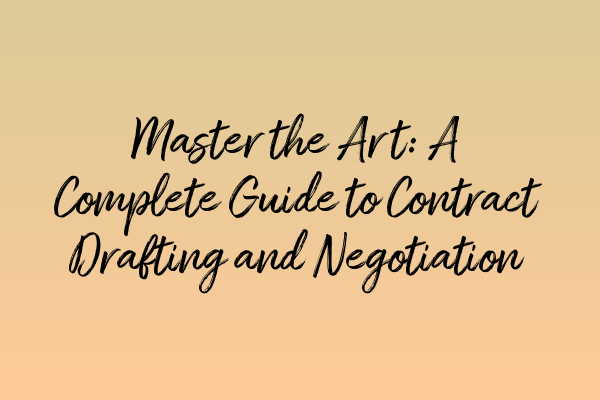Master the Art: A Complete Guide to Contract Drafting and Negotiation
Contracts are the foundation of business transactions and legal agreements. They play a crucial role in safeguarding the interests of all parties involved. As a solicitor, mastering the art of contract drafting and negotiation is essential to provide your clients with comprehensive legal advice and ensure the smooth execution of their business deals. In this complete guide, we will delve into the intricacies of contract drafting and negotiation, equipping you with the knowledge and skills needed to excel in this crucial aspect of legal practice.
The Importance of Contract Drafting and Negotiation
Effective contract drafting and negotiation are essential for various reasons. First and foremost, a well-drafted contract provides clarity and certainty, leaving no room for misinterpretation or ambiguity. It outlines the rights and obligations of all parties involved in the agreement, minimizing the potential for disputes and misunderstandings.
Additionally, successful negotiation ensures that all parties’ interests are represented and protected. By engaging in constructive discussions and finding common ground, solicitors can help their clients achieve favorable terms and conditions that align with their objectives.
Key Elements to Consider in Contract Drafting
When drafting a contract, several essential elements should be carefully addressed to ensure its validity and effectiveness:
- Parties: Clearly identify the parties involved in the agreement, including their legal names and contact information. This will prevent confusion and make it easier to enforce the contract if necessary.
- Terms and Conditions: Outline the specific rights, responsibilities, and obligations of each party. Be explicit and avoid vague language to minimize potential disputes.
- Consideration: Clearly state the consideration exchanged between the parties. Consideration refers to something of value, such as money, goods, or services, that is exchanged to bind the contract.
- Payment Terms: Specify the payment terms, including the amount, due dates, and acceptable methods of payment. State any late payment penalties or interest charges to incentivize timely payments.
- Dispute Resolution: Include provisions for resolving disputes, such as mediation, arbitration, or litigation. This helps avoid costly and time-consuming legal battles.
- Termination: Clearly define the circumstances under which the contract can be terminated and the process for doing so. This provides clarity and avoids confusion if either party wishes to end the agreement prematurely.
By carefully addressing these key elements, solicitors can draft comprehensive, enforceable contracts that protect their clients’ interests.
Tips for Successful Contract Negotiation
Contract negotiation is a delicate process that requires effective communication and negotiation skills. Here are some tips to master the art of contract negotiation:
- Prepare: Familiarize yourself with the details of the agreement and gather all relevant information before entering into negotiations. This will allow you to provide informed advice and effectively advocate for your client’s interests.
- Identify Objectives: Clearly understand your client’s objectives and prioritize them. This will guide your negotiation strategy and help you achieve favorable outcomes.
- Active Listening: Actively listen to the other party’s concerns and objectives. Understanding their perspective can help you find common ground and facilitate a mutually beneficial agreement.
- Communicate Clearly: Clearly articulate your client’s position and expectations. Use concise and persuasive language to convey your points effectively.
- Offer Solutions: Instead of merely rejecting proposals, offer alternative solutions that meet both parties’ interests. This promotes a collaborative negotiation atmosphere.
- Be Flexible: Be willing to compromise on non-essential issues without compromising your client’s core interests. Flexibility promotes a positive negotiation environment and increases the likelihood of reaching an agreement.
- Document the Agreement: Once an agreement is reached, ensure that all terms and conditions are properly documented in the final contract. Thoroughly review the document to avoid any discrepancies or omissions.
By following these tips and employing effective negotiation techniques, solicitors can skillfully navigate the complexities of contract negotiations, achieving favorable results for their clients.
Conclusion
Contract drafting and negotiation are essential skills for solicitors. By mastering the art of contract drafting and negotiation, solicitors can provide their clients with comprehensive legal advice, protect their interests, and ensure the successful execution of business agreements. By paying attention to key elements in contract drafting and employing effective negotiation techniques, solicitors can strengthen their professional capabilities, earning trust and reputation among their clients and peers.
Related Articles:
- Rights of the Accused: Protecting Individual Liberties in Criminal Proceedings
- Magistrates’ Court vs Crown Court: Understanding Key Differences
- Protecting Vulnerable Witnesses in Criminal Trials: Best Practices and Legal Safeguards
- Unraveling the Complexities of UK Bail Laws
- Cross-Examination Techniques: Mastering the Art of Questioning Witnesses


Leave a Reply